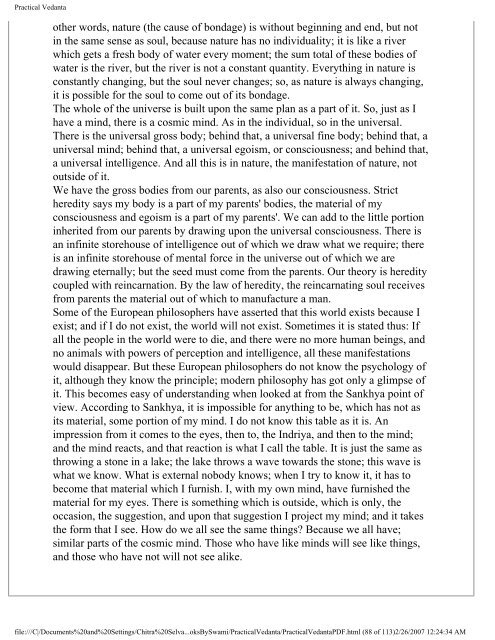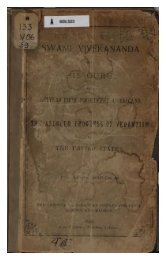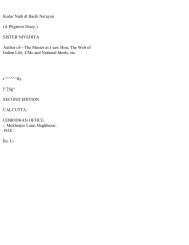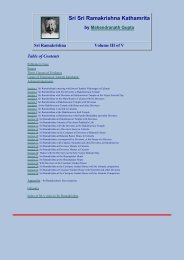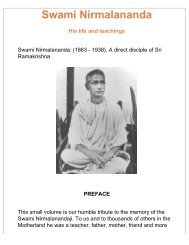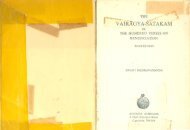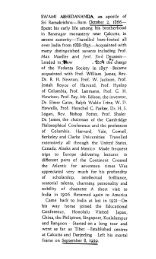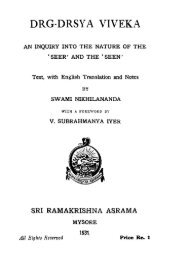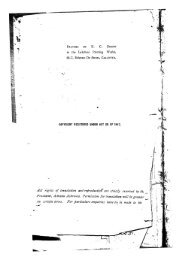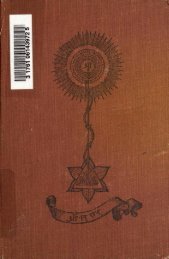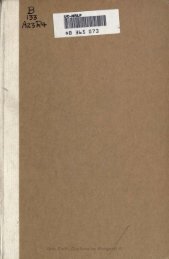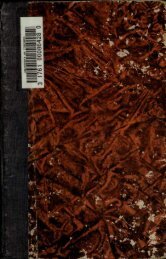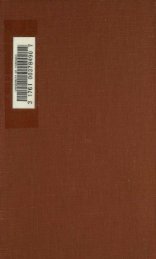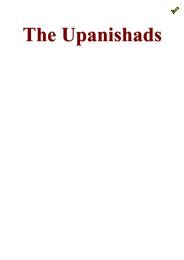<strong>Practical</strong> <strong>Vedanta</strong>other words, nature (the cause of bondage) is without beginning and end, but notin the same sense as soul, because nature has no individuality; it is like a riverwhich gets a fresh body of water every moment; the sum total of these bodies ofwater is the river, but the river is not a constant quantity. Everything in nature isconstantly changing, but the soul never changes; so, as nature is always changing,it is possible for the soul to come out of its bondage.The whole of the universe is built upon the same plan as a part of it. So, just as Ihave a mind, there is a cosmic mind. As in the individual, so in the universal.There is the universal gross body; behind that, a universal fine body; behind that, auniversal mind; behind that, a universal egoism, or consciousness; and behind that,a universal intelligence. And all this is in nature, the manifestation of nature, notoutside of it.We have the gross bodies from our parents, as also our consciousness. Strictheredity says my body is a part of my parents' bodies, the material of myconsciousness and egoism is a part of my parents'. We can add to the little portioninherited from our parents by drawing upon the universal consciousness. There isan infinite storehouse of intelligence out of which we draw what we require; thereis an infinite storehouse of mental force in the universe out of which we aredrawing eternally; but the seed must come from the parents. Our theory is hereditycoupled with reincarnation. By the law of heredity, the reincarnating soul receivesfrom parents the material out of which to manufacture a man.Some of the European philosophers have asserted that this world exists because Iexist; and if I do not exist, the world will not exist. Sometimes it is stated thus: Ifall the people in the world were to die, and there were no more human beings, andno animals with powers of perception and intelligence, all these manifestationswould disappear. But these European philosophers do not know the psychology ofit, although they know the principle; modern philosophy has got only a glimpse ofit. This becomes easy of understanding when looked at from the Sankhya point ofview. According to Sankhya, it is impossible for anything to be, which has not asits material, some portion of my mind. I do not know this table as it is. Animpression from it comes to the eyes, then to, the Indriya, and then to the mind;and the mind reacts, and that reaction is what I call the table. It is just the same asthrowing a stone in a lake; the lake throws a wave towards the stone; this wave iswhat we know. What is external nobody knows; when I try to know it, it has tobecome that material which I furnish. I, with my own mind, have furnished thematerial for my eyes. There is something which is outside, which is only, theoccasion, the suggestion, and upon that suggestion I project my mind; and it takesthe form that I see. How do we all see the same things? Because we all have;similar parts of the cosmic mind. Those who have like minds will see like things,and those who have not will not see alike.file:///C|/Documents%20and%20Settings/Chitra%20Selva...oksBySwami/<strong>Practical</strong><strong>Vedanta</strong>/<strong>Practical</strong><strong>Vedanta</strong>PDF.html (88 of 113)2/26/2007 12:24:34 AM
<strong>Practical</strong> <strong>Vedanta</strong><strong>Practical</strong> <strong>Vedanta</strong>12. A study of the Sankhya PhilosophyPrakriti is called by the Sânkhya philosophers indiscrete, and defined as theperfect balance of the materials in it; and it naturally follows that in perfectbalance there cannot be any motion. In the primal state before any manifestation,when there was no motion but perfect balance, this Prakriti was indestructible,because decomposition or death comes from instability or change. Again,according to the Sankhya, atoms are not the primal state. This universe does notcome out of atoms: they may be the secondary or the tertiary state. The primordialmaterial may form into atoms and become grosser and bigger things; and as far asmodern investigations go, they rather point towards the same conclusion. Forinstance, in the modern theory of ether, if you say ether is atomic, it will not solveanything. To make it clearer, say that air is composed of atoms, and we know thatether is everywhere, interpenetrating, omnipresent, and that these air atoms arefloating, as it were, in ether. If ether again be composed of atoms, there will stillbe spaces between every two atoms of ether. What fills up these? If you supposethat there is another ether still finer which does this, there will again be otherspaces between the atoms of that finer ether which require filling up, and so it willbe regressus ad infinitum, what the Sankhya philosophers call the "cause leadingto nothing" So the atomic theory cannot be final. According to Sankhya, nature isomnipresent, one omnipresent mass of nature, in which are the causes ofeverything that exists. What is meant by cause? Cause is the fine state of themanifested state; the unmanifested state of that which becomes manifested. Whatdo you mean by destruction? It is reverting to the cause If you have a piece ofpottery and give it a blow, it is destroyed. What is meant by this is that the effectsgo back to their own nature, they materials out of which the pottery was created goback into their original state. Beyond this idea of destruction, any idea such asannihilation is on the face of it absurd. According to modern physical science, itcan be demonstrated that all destruction means that which Kapila said ages ago —simply reverting to the cause. Going back to the finer form is all that is meant bydestruction. You know how it can be demonstrated in a laboratory that matter isindestructible. At this present stage of our knowledge, if any man stands up andsays that matter or this soul becomes annihilated, he is only making himself,ridiculous; it is only uneducated, silly people who would advance such aproposition; and it is curious that modern knowledge coincides with what thoseold philosophers taught. It must be so, and that is the proof of truth. Theyproceeded in their inquiry, taking up mind as the basis; they analysed the mentalfile:///C|/Documents%20and%20Settings/Chitra%20Selva...oksBySwami/<strong>Practical</strong><strong>Vedanta</strong>/<strong>Practical</strong><strong>Vedanta</strong>PDF.html (89 of 113)2/26/2007 12:24:34 AM
- Page 1 and 2:
Practical VedantaPractical VedantaP
- Page 3 and 4:
Practical Vedantaworld. If I am a s
- Page 5 and 6:
Practical Vedantadifference is only
- Page 7 and 8:
Practical VedantaThe ideal of faith
- Page 9 and 10:
Practical Vedantamoment of our live
- Page 11 and 12:
Practical Vedantaof the Christs and
- Page 13 and 14:
Practical Vedanta"This life is Brah
- Page 15 and 16:
Practical Vedantadark fifteen days,
- Page 17 and 18:
Practical Vedantalife. This is the
- Page 19 and 20:
Practical Vedantaeverything would b
- Page 21 and 22:
Practical Vedantait is only through
- Page 23 and 24:
Practical Vedantawhich is that subt
- Page 25 and 26:
Practical Vedantanoumenon and pheno
- Page 27 and 28:
Practical Vedantato which is the be
- Page 29 and 30:
Practical VedantaAbsolute.The finit
- Page 31 and 32:
Practical Vedantawhich is not the q
- Page 33 and 34:
Practical Vedantaexperience that th
- Page 35 and 36:
Practical Vedantafulfilled. The Jiv
- Page 37 and 38: Practical Vedantabetween the pure r
- Page 39 and 40: Practical Vedantacome out straight.
- Page 41 and 42: Practical Vedantawar with one anoth
- Page 43 and 44: Practical Vedantanobody could under
- Page 45 and 46: Practical VedantaMy idea, therefore
- Page 47 and 48: Practical Vedantathe same methods.
- Page 49 and 50: Practical Vedantavarious minds, all
- Page 51 and 52: Practical Vedantabrotherhood; but t
- Page 53 and 54: Practical Vedantabrotherhood, but w
- Page 55 and 56: Practical Vedantawe all go with ves
- Page 57 and 58: Practical Vedantareason. What can y
- Page 59 and 60: Practical Vedantabeen preached in t
- Page 61 and 62: Practical Vedantathe husband kisses
- Page 63 and 64: Practical Vedantaof the knowledge a
- Page 65 and 66: Practical Vedantafor those who only
- Page 67 and 68: Practical Vedantasun exists because
- Page 69 and 70: Practical Vedantaof death was pleas
- Page 71 and 72: Practical VedantaGod. We must learn
- Page 73 and 74: Practical Vedantaa plague comes, it
- Page 75 and 76: Practical VedantaAtman? "As with a
- Page 77 and 78: Practical Vedantathat immortal One,
- Page 79 and 80: Practical Vedantaand the third egoi
- Page 81 and 82: Practical VedantaWitness of the uni
- Page 83 and 84: Practical VedantaPractical Vedanta1
- Page 85 and 86: Practical Vedantaeternal ; every ot
- Page 87: Practical Vedantafaculty, Buddhi, w
- Page 91 and 92: Practical Vedantastepping-stone to
- Page 93 and 94: Practical Vedantarecognition? Findi
- Page 95 and 96: Practical Vedantasentient." This is
- Page 97 and 98: Practical Vedantaessentially differ
- Page 99 and 100: Practical Vedantaexistence is limit
- Page 101 and 102: Practical Vedantalive, for I am lif
- Page 103 and 104: Practical Vedantasee from Kapila's
- Page 105 and 106: Practical Vedantalimitation, but th
- Page 107 and 108: Practical Vedantaperfect, infinite,
- Page 109 and 110: Practical Vedantaindividuality, of
- Page 111 and 112: Practical Vedantarepeat [something]
- Page 113: Practical Vedantaperson who dies in


